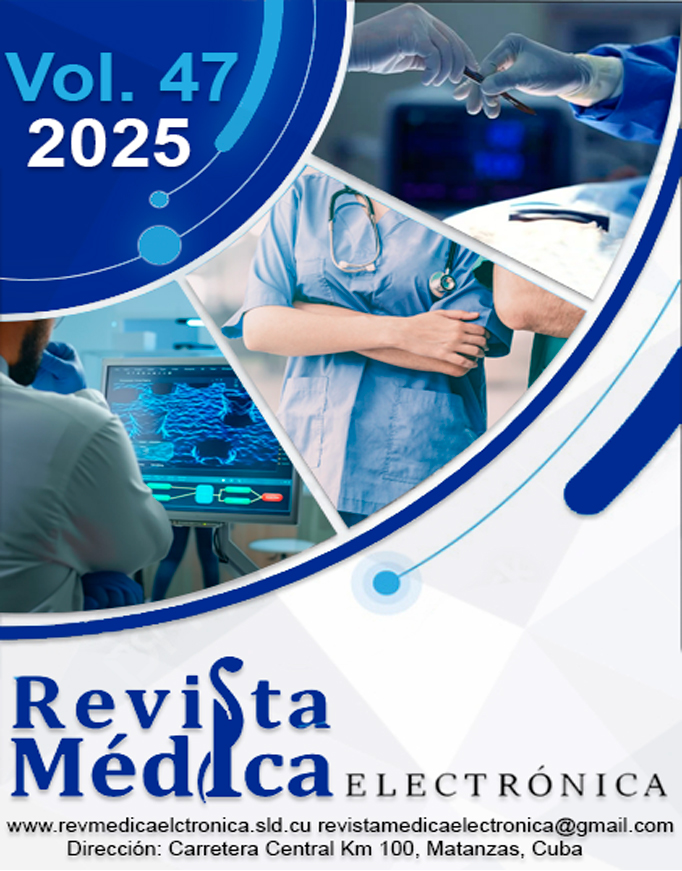Design of a diploma course for the guidance of cooperative learning with the virtual health classroom
Keywords:
professional improvement; guidance; cooperative learning; virtual environmentsAbstract
Introduction: In the new conception of cooperative learning in virtual environments, frequent transformations occur in the training process of new human resources in public health.
Objective: To design a diploma course for the guidance of cooperative learning with the use of the virtual health classroom.
Methods: A development research was carried out at the Faculty of Nursing-Technology of the University of Medical Sciences of Santiago de Cuba, with the participation of 35 professors, in the period from January to December 2023, for which theoretical, empirical, and statistical methods were used. The diploma course was submitted to the criteria of six specialists with more than 10 years of experience in teaching, and with teaching status of full and assistant professors, who provided evaluative judgments on its relevance and methodological structure.
Results: The documentary analysis allowed verifying the insufficiencies on the part of the teachers for the guidance of cooperative learning in virtual environments, group dynamics, learning strategies in a virtual context, as well as their little participation in development activities, that contribute to the improvement of professional performance in this area of knowledge. The above described motivated the design of the diploma program, with the aim of solving the declared problematic situations.
Conclusions: The designed diploma course contributed to the professional improvement of teachers for the guidance of cooperative learning with the use of the virtual health classroom in health technology programs.
Downloads
References
1. Ministerio de Educación Superior. Resolución No. 140/2019. Reglamento de la Educación de Posgrado de la República de Cuba [Internet]. La Habana: Ministerio de Educación Superior; 2019 [citado 10/12/2024]. Disponible en: https://instituciones.sld.cu/facultadfinlayalbarran/files/2020/11/RESOLUCION-140.2019.docx
2. Muñoz-Alonso LL, Valcárcel-Izquierdo N, Lazo-Pérez MA. Los tecnólogos en Optometría y Óptica y su desempeño profesional. Rev Méd Electrón [Internet]. 2024 [citado 10/12/2024];46:e5521. Disponible en: https://revmedicaelectronica.sld.cu/index.php/rme/article/view/5521
3. Villareño-Domínguez D, Torres-Martínez BL, Araujo-García M, et al. La superación profesional del sector cubano de la salud en el contexto educativo del siglo XXI. Biotempo [Internet]. 2021 [citado 10/12/2024];18(2):227-33. Disponible en: https://revistas.urp.edu.pe/index.php/Biotempo/article/view/4094
4. Aties López L, Burgal Cintra CJ, Antúnez Coca J. Fundamentación epistemológica de la superación profesional del tecnólogo en bioanálisis clínico. Revista de Investigación Formación y Desarrollo [Internet]. 2021 [citado 01/07/2024];9(3). Disponible en: https://portal.amelica.org/ameli/journal/562/5623610005/html/
5. Basain Valdés JM, Fernández Oliva B, Valdés Alonso MC, et al. Estrategia de superación profesional para la atención integral del paciente con diabetes mellitus tipo 1. Educ Méd Super [Internet]. 2023 [citado 10/12/2024];37(4). Disponible en: https://ems.sld.cu/index.php/ems/article/view/3755
6. Bonal Ruiz R, Valcárcel Izquierdo N, Roger Reyes MA. De la educación médica continua al desarrollo profesional continúo basado en competencias. Educ Méd Super [Internet]. 2020 [citado 10/12/2024];34(2). Disponible en: http://scielo.sld.cu/scielo.php?script=sci_arttext&pid=S0864-21412020000200024
7. Aranguren Peraza G, Zurita Aguilera MS. Impacto de la aplicación del aprendizaje cooperativo en aulas de Educación Básica. Paradigma. 2021;42(2):350-74. DOI: 10.37618/PARADIGMA.1011-2251.2021.p350-374.id1081.
8. Ania AO, Martín Hernández A, Miranda Álvarez JL. La superación profesional del profesor universitario a través de talleres. Un recurso valioso para su formación. Mapa [Internet]. 2020 [citado 01/07/2024];4(20). Disponible en: https://www.revistamapa.org/index.php/es/article/view/226
9. Añorga J. El perfeccionamiento del sistema de superación de los pro-fesores universitarios [tesis]. La Habana: Instituto Superior Pedagógico Enrique José Varona; 1989.
10. González González K, Robaina Santander M, Ruiz Ortiz L. Los entornos virtuales de aprendizaje en el proceso de enseñanza-aprendizaje de Biología Celular y Molecular. Ser cient Univ cienc inform [Internet]. 2022 [citado 10/12/2024];15(9):71-81. Disponible en: https://publicaciones.uci.cu/index.php/serie/article/view/1155
11. Pacheco L. Entornos virtuales en el aprendizaje cooperativo: una estrategia innovadora contemporánea. Rev Innova Educación [Internet]. 2021 [citado 10/12/2024];4(1):65-77. Disponible en: https://revistainnovaeducacion.com/index.php/rie/article/view/432
12. Guevara de León T, Chacón Benítez MD, Cabrera Pérez V, et al. Pertinencia de la superación posgraduada en correspondencia con los problemas de salud en Villa Clara. Edumecentro [Internet]. 2024 [citado 10/12/2024];16(1). Disponible en: https://revedumecentro.sld.cu/index.php/edumc/article/view/2635
13. Burgal Cintra CJ, Antúnez Coca J, Marino Madariaga CI. Pertinencia del aprendizaje cooperativo en las carreras de Tecnología de la Salud. Edumecentro [Internet]. 2019 [citado 01/07/2024];11(2):230-4. Disponible en: http://scielo.sld.cu/scielo.php?script=sci_arttext&pid=S2077-28742019000200230
14. Basantes Arias EA, Chamorro Ortega CP, Yánez Valle VV. Innovadora gestión del conocimiento para el aprendizaje cooperativo en la Educación Básica Superior. Bib An Invest [Internet]. 2023 [citado 01/07/2024];19(1). Disponible en: http://revistas.bnjm.sld.cu/index.php/BAI/article/view/574/529
15. Tapia C. Moodle un Entorno Virtual de Aprendizaje que promueve el trabajo autónomo y el pensamiento crítico. Horizontes [Internet]. 2022 [citado 01/07/2024];6(26):2238-53. Disponible en: https://revistahorizontes.org/index.php/revistahorizontes/article/view/746/1464
Downloads
Published
How to Cite
Issue
Section
License
Copyright (c) 2025 Revista Médica Electrónica (Medical Electronic Journal)

This work is licensed under a Creative Commons Attribution-NonCommercial 4.0 International License.
All content published in this journal is Open Access, distributed under the terms of the CC BY-NC 4.0 License.
It allows:
- Copy and redistribute published material in any medium or format.
- Adapt the content.
This will be done under the following terms:
- Attribute the authors' credits and indicate whether changes were made, in which case it must be in a reasonable way.
- Non-commercial use.
- Recognize the journal where it is published.
The copyrights of each article are maintained, without restrictions.






